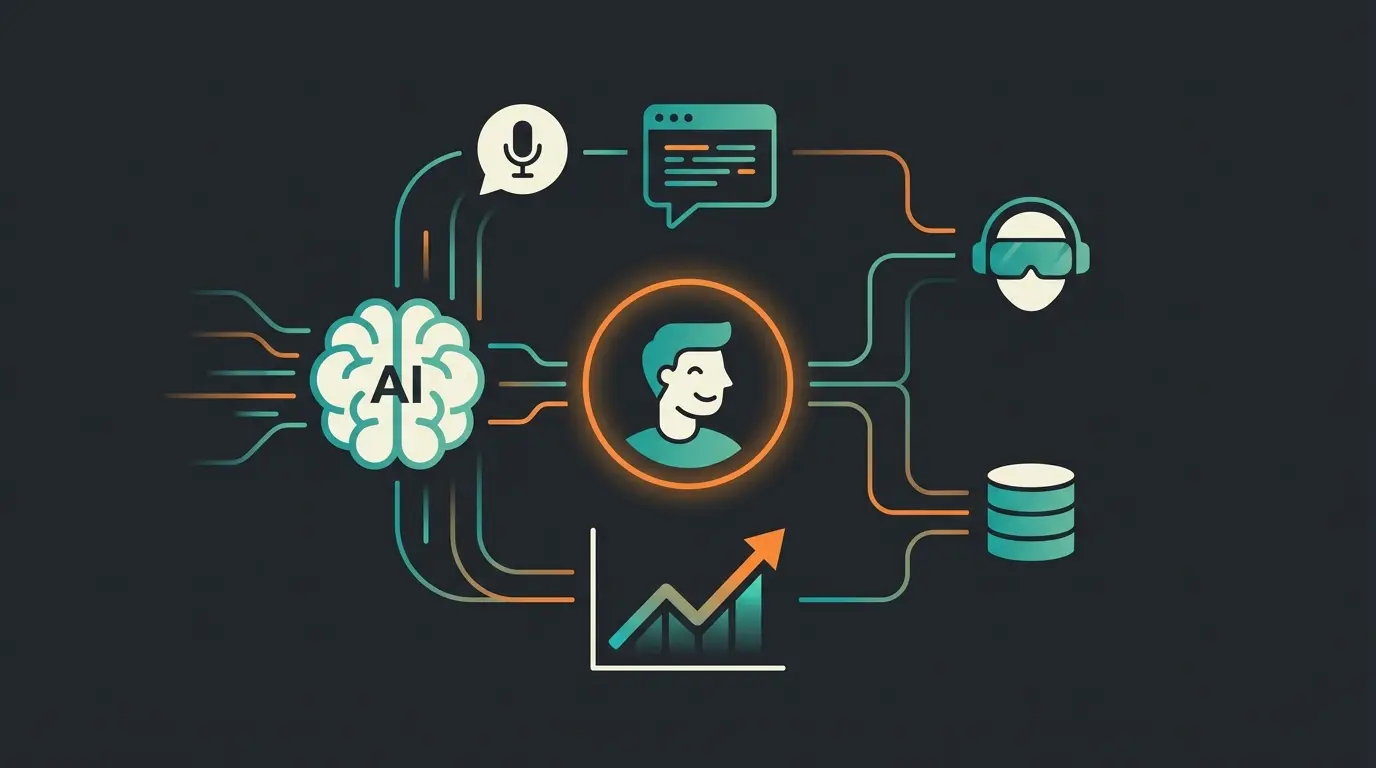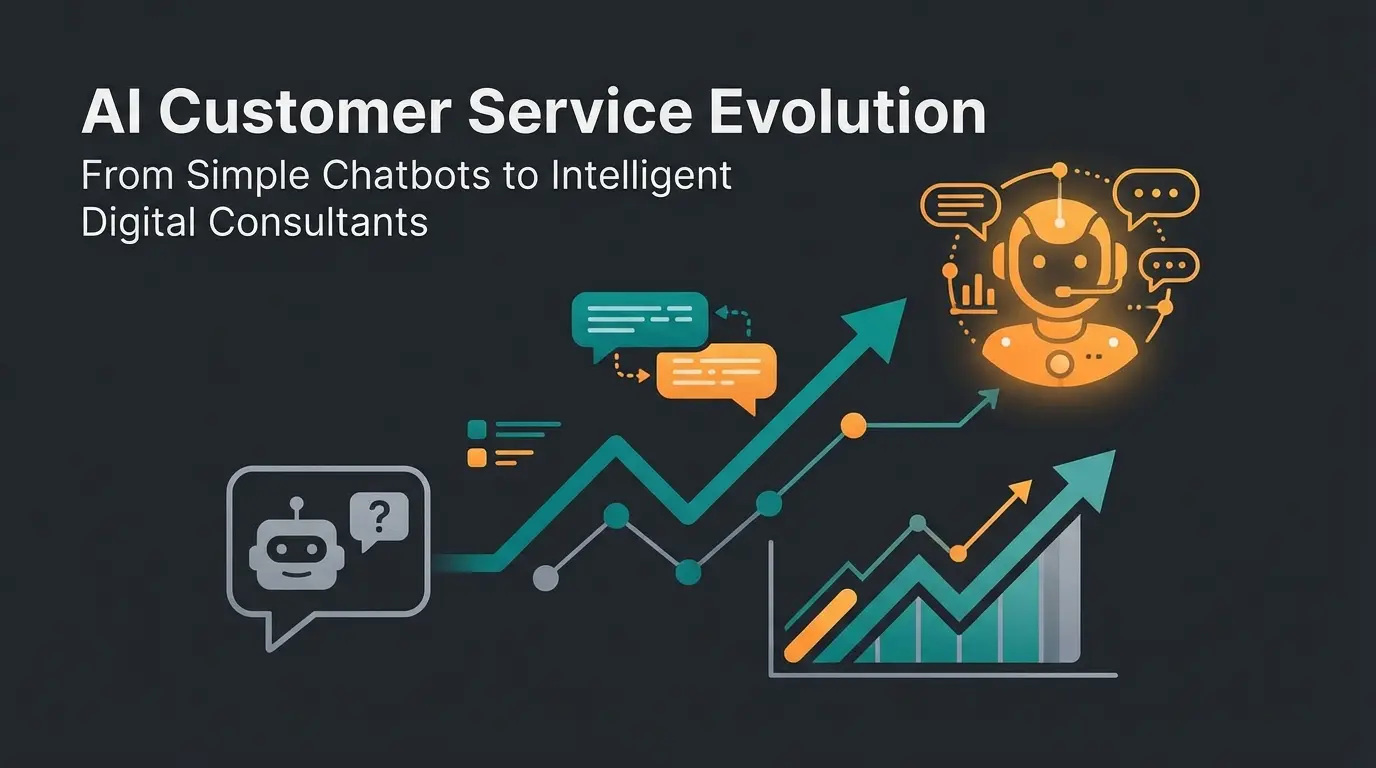Introduction: The New Era of AI Customer Service
German customer service is undergoing a significant digital transformation in 2024. The integration of AI-powered customer service is delivering impressive results: companies are achieving cost savings of up to 70% while simultaneously increasing customer satisfaction by an average of 35%.
However, the latest AI technologies in customer service go far beyond simple chatbots. Modern systems leverage advanced algorithms for personalized customer interactions, automated problem-solving, and proactive service approaches. This evolution enables a previously unattainable quality in automated customer care—but more importantly, it opens the door to something most companies are completely missing: AI-driven product consultation that generates revenue.
Current studies confirm the effectiveness of AI in customer service: 89% of customer inquiries are answered within seconds, and satisfaction rates with implemented systems exceed 85%. These success rates significantly surpass traditional customer support. Yet the real story isn't about answering 'Where is my package?' faster—it's about transforming customer service from a cost center into a revenue driver.
The ROI of AI implementations in customer service manifests in various areas: reduced personnel costs, increased efficiency, and higher customer retention. Companies report amortization periods between 6 and 18 months while simultaneously improving service quality. But forward-thinking organizations are discovering an even more compelling metric: conversion rate increases through intelligent pre-purchase consultation.
Average savings through AI automation
Improvement in customer satisfaction scores
Inquiries answered within seconds
Typical amortization period
What is AI in Customer Service? The Fundamentals
Technological Foundation
The foundation of modern AI customer care is Natural Language Processing. This technology enables AI systems to understand human language and conduct natural conversations. Machine learning algorithms continuously improve response quality by learning from every interaction.
But here's the critical distinction most companies miss: there are two fundamentally different types of AI in customer service. Reactive AI handles support tickets after problems occur—password resets, order tracking, return requests. Proactive AI engages customers before they make purchasing decisions, guiding them toward the right products and preventing problems before they happen.
Core AI Components
The AI architecture in customer service is built on three main components: language processing for text comprehension, context analysis for capturing customer intent, and response generation for appropriate answers. These components work seamlessly together, enabling precise customer care.
For product consultation AI, there's a fourth critical component: product data integration. Unlike FAQ bots that search a static knowledge base, consultation AI connects directly to your Product Information Management (PIM) system, understanding attributes like size, material, compatibility, and availability in real-time.
Practical Applications
AI systems in customer service handle various tasks: from automatic email categorization and chatbot communication to predictive customer care. Particularly successful implementations appear in product consultation, appointment scheduling, and first-level problem resolution.
The most sophisticated applications, however, go beyond resolving issues. They help customers make better purchasing decisions—acting as digital sales assistants rather than support agents. This shift from 'solving problems' to 'preventing problems through better advice' represents the future of AI customer service.

Technology Comparison
Selecting the right AI technology depends on specific business requirements. While rule-based systems suffice for simple inquiries, AI-powered solutions with deep learning offer the highest flexibility and adaptability. Integration with existing CRM systems plays a central role in success.
For e-commerce and product-heavy businesses, the choice is even more crucial. A simple FAQ bot that searches for keywords will never provide the nuanced guidance a customer needs when choosing between 47 different laptops. Only AI that understands product attributes and can ask qualifying questions can deliver true consultation.
FAQ Bot vs. AI Product Consultant: The Critical Difference
Most articles about AI customer service equate 'service' with 'support'—solving problems after purchase. They completely miss the pre-sales service angle: helping customers buy the right product in the first place. This is where the real opportunity lies.
The distinction between a 'dumb' FAQ bot and a 'smart' Consultant AI is profound. FAQ bots retrieve static answers based on keyword matching. They're essentially glorified search engines for your help documentation. A Consultant AI, on the other hand, understands product attributes, asks qualifying questions, and guides customers to optimal purchasing decisions.
| Feature | Traditional FAQ Chatbot | AI Product Consultant |
|---|---|---|
| Goal | Avoid tickets (reduce costs) | Drive purchases (increase revenue) |
| Technology | Keyword matching in FAQs | Understands product attributes & context |
| Dialogue Style | Passive ('What is your question?') | Active ('What purpose are you looking for?') |
| Data Source | Static help pages | Live product data & inventory |
| Outcome | Link to a help article | Personalized product recommendation |
| Customer Value | Problem solved after frustration | Right product chosen, no returns |
Consider this example: A customer types 'I need a laptop for video editing.' A traditional FAQ bot might respond with 'Here are our laptop return policies' or at best provide a generic link to the laptop category. An AI Product Consultant responds: 'Great! Do you primarily work with 4K footage, and do you prefer Mac or Windows?' This follow-up question demonstrates understanding of the actual need and guides the customer toward an informed decision.
The Revenue Impact of Consultation AI
Here's what most companies get wrong: they frame AI as a cost-saver focused on efficiency. There's a massive opportunity to frame AI as a revenue-generator through conversion uplift via product consultation.
When AI helps customers find exactly the right product, three things happen: conversion rates increase because customers feel confident in their choice, return rates decrease because customers bought what they actually needed, and customer lifetime value improves because the positive experience builds loyalty.
Personalization Through AI
Personalization in customer service reaches new dimensions through AI technologies. Modern AI-powered customer communication analyzes customer data in real-time, creating precise customer profiles.
Data-Driven Customer Profiles
AI systems process various data sources such as purchase history, communication behavior, and interaction patterns. This information enables accurate assessment of customer needs. The personalized AI customer consultation automatically adapts answers and solution suggestions.
For product consultation, these profiles become even more powerful. The AI remembers not just that a customer had a problem with their last order, but that they prefer sustainable products, typically shop for outdoor activities, and have a medium-high budget range. Every recommendation becomes contextually relevant.
Real-Time Personalization
The AI recognizes moods and intentions during the conversation. This allows responses to be adjusted immediately. The system continuously learns from every interaction and steadily improves its personalization.
In a product consultation context, real-time personalization means the AI adapts its questioning strategy based on how the customer responds. Technical customers get detailed specifications; casual buyers get benefit-focused descriptions. The conversation flows naturally toward the perfect product match.
Sentiment Analysis in Practice
Modern AI systems analyze tone, word choice, and context of customer inquiries. This sentiment analysis enables emotionally appropriate responses and early recognition of critical situations.
When a customer expresses frustration or uncertainty, the AI can adjust its approach—perhaps offering to connect them with a human consultant, or slowing down to provide more detailed explanations. This emotional intelligence separates true consultation from mere keyword matching.
CRM Integration
Linking AI systems with existing CRM solutions creates a unified data foundation. Customer advisors thereby have access to all relevant information and can provide personalized recommendations.
For product consultation AI, integration goes further—connecting to PIM (Product Information Management) systems, inventory databases, and even pricing engines. The AI knows not just who the customer is, but exactly what products are available, what's in stock, and what promotions might apply.
Discover how AI product consultation can increase conversions while reducing support costs. See the difference between FAQ bots and intelligent consultation AI.
Request Free DemoHow AI Reduces Return Rates Through Pre-Purchase Service
Here's a perspective most companies miss: the best customer service happens before the purchase, not after. When AI helps customers choose the right product, you're not just making a sale—you're preventing a return, a complaint, and a frustrated customer.
Consider the 'choice overload' problem: customers facing dozens or hundreds of similar products often make suboptimal decisions or abandon their cart entirely. An AI Product Consultant cuts through this paralysis by asking the right questions and narrowing options to the most suitable choices.

The Dialogue Difference in Action
Let's look at a concrete example that illustrates the difference between basic bots and consultation AI:
Scenario: Customer asks 'Which running shoe is best for marathon training on asphalt?'
FAQ Bot Response: 'Here are some articles about our running shoes' or 'Please visit our running shoe category.' The customer is left to figure out the answer themselves, likely choosing poorly or leaving the site.
AI Product Consultant Response: 'Great choice focusing on marathon training! To recommend the perfect shoe, I have a few quick questions: What's your typical weekly mileage? Do you have any known pronation issues? And what's your priority—maximum cushioning for joint protection, or a lighter weight for speed?' Based on the answers, the AI recommends specific models with explanations of why each feature matches the customer's needs.
This is the fundamental shift: from AI that searches for keywords to AI that acts as a knowledgeable sales assistant. The customer gets better service, makes a confident purchase, and is far less likely to return the product.
Practical Implementation
The successful introduction of AI in customer service requires a structured approach. The ROI of AI in customer service must be continuously monitored.
Technical Prerequisites
- Data Quality: Clean, structured customer data as the foundation
- Product Data: PIM integration for real-time product attributes and availability
- Integration: Interfaces to existing CRM, ERP, and e-commerce systems
- Security: Encrypted data transmission and storage (GDPR compliance essential)
- Performance: Sufficient server capacity for real-time processing
Implementation Checklist for Companies
Assess quality of customer, product, and interaction data. Clean and structure as needed.
Identify high-value applications: product consultation, support triage, or both.
Connect AI to CRM, PIM, and knowledge bases. Ensure real-time data flow.
Deploy with limited scope. Gather feedback and optimize responses.
Prepare staff for human-AI collaboration. Define handoff protocols.
Scale to all channels. Monitor KPIs and continuously improve.
Success Measurement Through KPIs
Measuring success is based on concrete metrics. Important indicators include response times, resolution rates, and customer satisfaction. Regular evaluation of these KPIs enables continuous optimization.
For product consultation AI, additional metrics become critical: conversion rate of AI-assisted sessions, average order value from AI recommendations, return rate for AI-recommended products, and customer engagement depth (questions asked, products explored).
Avoiding Implementation Mistakes
Common mistakes in AI implementation can be avoided through careful planning. This includes phased introduction with test phases and regular user feedback. Involving employees from the beginning is crucial for success.
The biggest mistake? Deploying a generic FAQ bot and calling it 'AI customer service.' If your AI can't do more than search your help documentation, you're not leveraging the technology's true potential. Ensure your implementation focuses on genuine consultation capabilities, not just automated FAQ retrieval.
Human & Machine: The Optimal Balance
A successful integration of AI systems in customer service is built on a clear division of tasks between technology and human employees. The optimal balance makes it possible to leverage the strengths of both sides.
Efficient Division of Labor Between AI and Employees
AI systems handle standardized inquiries, routine tasks, and initial customer contact. The technology works around the clock and guarantees fast response times. Human employees focus on complex consultation conversations, emotional situations, and strategic tasks.
A professional change management approach during AI integration is the key to success. Employees must be involved and trained from the beginning to optimally utilize the new technologies.
- Automation: Standard inquiries, FAQs, product information, initial qualification
- Analysis: Data evaluation, customer behavior patterns, trend identification
- AI Consultation: Product recommendations, sizing guidance, compatibility checks
- Human Support: Conflict management, individual consultation, special cases, emotional situations
Employee Qualification
Training service employees plays a central role. They must be able to work with AI systems and understand how to integrate the new tools into their daily work. Regular continuing education ensures the quality of hybrid customer care.
Importantly, employees should view AI as a colleague that handles routine work, freeing them for the complex, rewarding interactions where human empathy and creativity shine. This reframing transforms potential resistance into enthusiasm.
Data Protection and Ethics
Protecting customer data is the top priority. Transparent processes and clear guidelines build trust with customers and employees. Ethical use of AI in customer service is based on:
- Fairness in automated decisions—no discrimination based on customer demographics
- Protection of privacy—minimal data collection, maximum transparency
- Transparency of AI processes—clear disclosure when customers interact with AI
- Responsible handling of customer data—GDPR compliance as baseline, not ceiling
Future Perspectives: What's Next for AI Customer Service
AI technology in customer service is developing rapidly. New possibilities emerge through improved speech recognition, multimodal interaction, and predictive analytics.
Innovative AI Technologies for Better Service
The next generation of AI systems will respond even more precisely to individual customer needs. Emotional AI recognizes moods and adjusts communication accordingly. Multilingual systems enable seamless communication in all languages without additional cost.
Augmented Reality and Virtual Reality complement AI-supported consultation with visual elements. These technologies particularly improve product consultation and technical support—imagine showing a customer exactly how a piece of furniture would look in their room, or walking them through a complex product setup step by step.
Opportunities and Challenges
The integration of AI in customer service offers great opportunities for cost savings and quality improvements. Automated processes increase efficiency, while personalized care enhances customer satisfaction.
The biggest opportunity? Shifting from reactive support to proactive consultation. Companies that recognize AI as a revenue driver—not just a cost reducer—will gain significant competitive advantage.
Risk Management
At the same time, companies must remain vigilant. Key considerations include:
- Dependence on technical systems—ensure backup protocols for outages
- Data protection challenges—stay current with evolving regulations
- Customer acceptance—some customers still prefer human interaction
- Balance between automation and human contact—over-automation can feel cold
- AI accuracy—consultation errors erode trust faster than support errors
With a well-thought-out strategy and regular adjustments, AI in customer service can be deployed sustainably and profitably. The combination of technological innovation and human expertise creates the best conditions for excellent service.

Frequently Asked Questions About AI Customer Service
No, AI complements rather than replaces human staff. AI handles routine inquiries, product information requests, and initial qualification, freeing human employees to focus on complex consultation, emotional situations, and relationship-building tasks. The most successful implementations use AI for first-level support and product consultation while humans handle escalations and nuanced problems. This hybrid approach typically improves both efficiency and employee job satisfaction.
Traditional chatbots use keyword matching to retrieve static FAQ answers—they're essentially search engines for your help documentation. AI product consultation is fundamentally different: it understands product attributes (size, material, compatibility), asks qualifying questions to understand customer needs, and provides personalized recommendations based on real-time product data. While a chatbot might say 'here's our laptop category,' a consultation AI asks 'Do you work with 4K video? Mac or Windows preference?' and recommends specific models.
Most companies report ROI within 6-18 months, depending on implementation scope and use case. Cost-reduction ROI (through efficiency gains) typically appears faster, within 6-9 months. Revenue-generation ROI (through improved conversions and reduced returns from better product consultation) often takes 9-18 months to fully materialize but tends to be more substantial long-term. The key is measuring both cost savings and revenue impact from the start.
AI customer service can absolutely be GDPR compliant, but compliance requires careful implementation. Key requirements include: processing data within the EU, providing clear disclosure when customers interact with AI, ensuring data minimization (collecting only necessary information), offering opt-out mechanisms, and maintaining transparency about how customer data informs recommendations. Choose AI vendors who prioritize European data protection standards and can demonstrate compliance.
AI consultation improves conversions through three mechanisms: First, it reduces 'choice overload' by helping customers navigate large catalogs to find exactly what they need. Second, it builds purchase confidence by explaining why specific products match customer requirements. Third, it reduces cart abandonment by answering questions instantly rather than requiring customers to search or wait for human support. Companies implementing AI product consultation typically see conversion improvements of 15-35% on assisted sessions.
See how AI product consultation drives revenue, reduces returns, and delivers customer experiences that build loyalty. Join leading e-commerce companies already using intelligent consultation AI.
Start Your Free Trial
